Blog
Top Stories
Centre’s New Initiative to Connect MSMEs with Global Market
The Department of Promotion of Industry and Internal Trade (DPIIT), Ministry of Commerce and Industry Initiative “One District, One Product” (ODOP) aims at fostering balanced regional development across all districts of the country by selection, branding, and promoting one product from each district of the country. The ODOP Initiative aims at attracting investment in the district and boosting manufacturing and exports, thereby generating employment in the district. ODOP is operationally merged with the “Districts as Export Hubs” initiative.
The Developing Districts as Export Hubs (DEH) initiative is a flagship export promotion initiative of Director General of Foreign Trade (DGFT), with the vision to transform every district into a vibrant contributor to national exports. It builds upon and now incorporates the One District One Product (ODOP) initiative to streamline export potential at the grassroots level. Each district identifies one or more products or services with export potential and creates a District Export Action Plan (DEAP) to support quality, capacity, market access, and infrastructure. A District Export Promotion Committee (DEPC), led by local administration in partnership with DGFT regional authorities, oversees execution. State-level Export Promotion Committees support coordination across districts and the DGFT implements and monitors via a national portal. ODOP products are promoted at international events through engagement with Indian Missions abroad.
The Government facilitates participation of Micro, Small and Medium Enterprises (MSMEs) in International Trade Fairs through the International Co-operation Scheme of the Ministry. The scheme aims to build Capacity of MSMEs for entering export market by facilitating their participation in international exhibitions/ fairs/conferences/ seminar/buyer-seller meets abroad as well as providing them with actionable market-intelligence and reimbursement of various costs involved in export of goods and services. The Scheme provides opportunities to MSMEs to continuously update themselves to meet the challenges emerging out of changes in technology, changes in demand, and emergence of new markets.
The components of training in digital marketing and e-commerce are embedded in schemes like Procurement and Marketing Support and MSME Trade Enablement and Marketing (MSME TEAM) schemes of the Ministry of MSME. Government provides financial incentives/concessions through schemes like Prime Ministers Employment Generation Programme, PM Vishwakarma, Procurement and Marketing Support, International Cooperation, Khadi Gramodyog Vikas Yojana, Coir Vikas Yojana etc, for enterprise creation, capacity building, tool kits, etc. Through the Credit Gaurantee Fund Trust (CGTMSE), Government provides guarantee cover for Micro and Small Enterprises (MSEs), with increased cover for women owned enterprises.
This information was given by the Minister of State for Micro, Small and Medium Enterprises, Smt. Sushri Shobha Karandlaje, in a written reply in the Rajya Sabha today.
Micro-lending unlocks potential of India’s hidden entrepreneurs
Micro-lending unlocks potential of India’s hidden entrepreneurs
The micro, small, and medium enterprise (MSME) sector has often been hailed as the backbone of India’s economy, driving innovation, fostering employment, and contributing significantly to the gross domestic product (GDP) growth. Yet, beneath this celebrated narrative lies the sector’s perpetual struggle for financial support. With micro-lending emerging as a critical tool to bridge this gap, a series of regulatory shifts and strategic advancements are reshaping the sector, steering it towards resilience and sustainability. This challenge was discussed at a CareEdge webinar titled ‘Exploring MSME Growth and the Evolving Micro LAP Landscape’.
A new regulatory era
The MSME financing landscape has undergone a seismic shift with the introduction of a stricter 90-day default norm, replacing the earlier 180-day standard. While this move aligns with global practices, it has ushered in significant changes for lenders, who now face the dual challenge of adapting to regulatory compliance and ensuring financial accessibility for small enterprises. This transition demands precision and innovation, particularly as many MSMEs operate with unpredictable cash flows.
One transformative solution has been the adoption of digital tools to assess cash flow patterns, enabling lenders to accurately gauge the financial health of these businesses. For example, advanced algorithms now analyse transaction histories and supply chain activities, offering a more comprehensive picture of creditworthiness. These digital advances have proved invaluable in addressing the sector’s hallmark challenge — a lack of formal financial records.
Moreover, lenders are crafting empathetic and tailored recovery models to mitigate the stress of rigid compliance. Personalised solutions, such as phased repayment plans, help strike a delicate balance between meeting regulatory demands and supporting MSMEs through their unique financial journeys. The successful alignment with the 90-day norm highlights the sector’s ability to adapt, yet it serves as a reminder of the vigilance required to maintain momentum.
Profitability in a competitive landscape
For lenders, staying profitable in an increasingly competitive environment is no easy feat. The MSME sector, however, offers untapped potential that can be a game-changer. Recent industry reports reveal that only a fraction of India’s estimated 63 million MSMEs currently have access to formal credit channels, leaving vast opportunities for financial institutions to explore.
The key lies in understanding the complexities of MSME financing. Addressing higher credit costs, for instance, requires nuanced pricing strategies that ensure fairness without compromising margins. A case in point is the willingness of borrowers to absorb moderate interest rate increases — data suggests that even a 3% hike has had minimal impact on demand, allowing lenders to maintain profitability while passing on costs.
Customer-centric execution has also emerged as a vital strategy. By tailoring services to the specific needs of micro-enterprises, lenders are not only fostering loyalty but also creating a competitive edge. For example, non-banking financial companies (NBFCs) offering flexible collateral options have gained significant traction among MSMEs, reinforcing the importance of adaptability in service delivery.
As funding costs show signs of easing, the future holds promising opportunities for higher margins. However, long-term success hinges on a deeper understanding of the sector’s intricacies and a commitment to innovation.
The role of technology in monitoring and growth
Technology has been a powerful enabler in redefining micro-lending. The deployment of account aggregator systems, for instance, has provided lenders with unparalleled visibility into borrowers’ financial transactions. These platforms streamline the end-use monitoring of loans, ensuring greater transparency and accountability.
Yet, challenges remain. While account aggregators simplify access to bank statements, the fungibility of money often obscures the precise utilisation of loan funds. To address this, lenders are continuously enhancing their systems, incorporating machine learning and blockchain technology to improve accuracy and traceability.
Take the example of fintech start-ups partnering with traditional banks to develop blockchain-based loan tracking systems. These collaborations are not only meeting regulatory requirements but are also setting new standards in responsible lending practices. Such innovations highlight the symbiotic relationship between technology and traditional approaches, paving the way for a more robust financial ecosystem.
Harnessing the promise of MSMEs
The MSME sector stands as a beacon of resilience and untapped potential. By embracing regulatory changes, leveraging technology, and addressing the unique challenges faced by micro-enterprises, stakeholders can unlock new avenues for growth and transformation.
For those at the forefront of micro-lending, the message is clear: dive deeper, innovate boldly, and stay attuned to the needs of this vibrant sector. With countless opportunities awaiting exploration, the story of MSMEs is one of determination, dynamism, and an unwavering drive to succeed.
Sector Overview
As of 4 February 2025, the Udyam Portal boasts 5,93,38,604 registered MSMEs, with the vast majority classified as micro-enterprises. Beyond their economic contributions, these MSMEs have created substantial employment opportunities, providing jobs to more than 25.18 crore individuals.
During the financial year 2023-24, the Prime Minister’s Employment Generation Programme (PMEGP) supported 89,118 enterprises, fostering entrepreneurship across various sectors. The scheme disbursed ₹3,093.87 crore as margin money subsidy, helping small businesses scale operations and sustain growth. Consequently, an estimated 7,12,944 employment opportunities were created, reaffirming PMEGP’s role in bolstering self-employment and job creation nationwide.
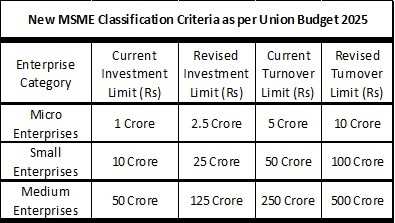 Contribution to gross domestic product: The MSME sector contributes approximately 30% to India’s gross domestic product, with micro-enterprises accounting for 97% of the total share.
Contribution to gross domestic product: The MSME sector contributes approximately 30% to India’s gross domestic product, with micro-enterprises accounting for 97% of the total share.
Credit access: Despite their significance, only 2.5 crore MSMEs out of 63.4 million units have accessed formal credit channels. This highlights the untapped potential for micro-lending.
Women entrepreneurs: Women-owned MSMEs make up 38% of registered enterprises, reflecting the growing role of women in this sector.
Export contribution: MSMEs contribute around 45.79% in 2024-25 (up to May 2024) of India’s total exports, showcasing their importance in global trade.
(Write to us at editorial@bombaychamber.com)
Khadi: From Freedom Fabric to Fashion Icon – KVIC Chairman Inaugurates Exhibition in New Delhi
Khadi: From Freedom Fabric to Fashion Icon – KVIC Chairman Inaugurates Exhibition in New Delhi
In a grand celebration of India’s heritage and modern fashion, Khadi and Village Industries Commission (KVIC) Chairman Mr. Manoj Kumar inaugurated an extraordinary exhibition themed “Khadi: The Fabric of Freedom, The Language of Fashion” at the prestigious Gandhi-King Memorial Plaza, India International Centre (IIC), Lodhi Road, New Delhi. The exhibition, which runs until October 22, from 11 AM to 7 PM, is organized in collaboration with the Centre of Excellence for Khadi (COEK) and the National Institute of Fashion Technology (NIFT).
The exhibition traces Khadi’s remarkable transformation from a hand-spun fabric that played a pivotal role in India’s freedom movement to its current status as a sustainable, fashionable choice in the global fashion industry.
Inaugurating the event, KVIC Chairman Mr. Manoj Kumar shared his thoughts:
“The Khadi that played a crucial role in the freedom movement of India under the leadership of Mahatma Gandhi has now, thanks to PM Modi’s relentless efforts, become a fashion symbol and a center of attraction for the ‘New Khadi of New India.'”
The inauguration was graced by IIC Director Mr. K.N. Srivastava, who joined Mr. Kumar in extending Prime Minister Narendra Modi’s vision of “Khadi for Fashion.” The exhibition invites visitors to explore Khadi’s unique journey, presenting an array of products that include traditional hand-spun fabrics as well as contemporary designs blending heritage and modern aesthetics.
Key Features of the Exhibition:
Khadi Timeline:
A captivating display that highlights Khadi’s role in India’s freedom movement with archival photos, inspiring quotes from Mahatma Gandhi, and historical records showcasing the fabric’s deep-rooted significance.
Experience Center:
A live demonstration of the spinning process using traditional Bardoli and Peti charkhas allows visitors to witness the meticulous craftsmanship that goes into creating Khadi fabric.
Modern Designs:
Contemporary Khadi fabrics, sarees, home textiles, and more are exhibited, all designed by the Centre of Excellence for Khadi in collaboration with Khadi institutions. These creations reflect the perfect synergy between tradition and modernity.
Khadi Retail Stalls:
Authentic Khadi garments, including the latest designs developed by COEK, will be available for purchase. Visitors can shop for exclusive items made from this exquisite fabric.
KVIC Chairman Mr. Manoj Kumar, addressing the media, emphasized the importance of Khadi in India’s socio-economic landscape, quoting Mahatma Gandhi:
“The Father of the Nation, Mahatma Gandhi, once said, ‘I see God in every thread drawn by the spinning wheel.’ Embracing this philosophy, KVIC, under Prime Minister Narendra Modi’s leadership, is organizing various programmes like sales campaigns, exhibitions, and national and international fairs to boost Khadi artisans’ income, which has played a significant role in promoting Khadi products.”
Mr. Kumar further elaborated on Khadi’s growth under PM Modi’s leadership:
“The Khadi that played a key role in the freedom movement under Gandhi’s leadership has now become a fashion icon, thanks to PM Modi’s tireless efforts, and is now known as the ‘New Khadi of New India.’ He highlighted KVIC’s achievements, noting that Khadi’s business turnover under PM Modi’s leadership has surpassed ₹1.55 lakh crore in the financial year 2023-24, a remarkable growth from ₹31,000 crore ten years ago.”
He also discussed PM Modi’s ‘Mann Ki Baat’ programme, which has made Khadi a new status symbol among the youth, and praised COEK’s innovative contributions to popularizing Khadi.
“Since PM Modi’s appeal, the Khadi Gramodyog Bhawan in Connaught Place, Delhi, has set new sales records every year on Gandhi Jayanti, with sales surpassing ₹2 crore this year on October 2. These figures symbolize that ‘New Khadi of New India,’ under PM Modi’s leadership, has become the flag bearer of the ‘Vocal for Local,’ ‘Make in India,’ and ‘Aatmanirbhar Bharat’ campaigns.”
KVIC Chairman Mr. Manoj Kumar concluded his address with an appeal to the public:
“I urge all citizens to purchase more Khadi products this festive season, helping spread the joy of festivals to the homes of artisans and craftsmen who work tirelessly to produce high-quality goods.”
The exhibition is a significant step in boosting Khadi’s reputation as a modern fashion choice while promoting sustainable and locally-made products. KVIC and NIFT officials and employees also attended the event.
About KVIC:
The Khadi and Village Industries Commission (KVIC) is a statutory body under the Ministry of Micro, Small, and Medium Enterprises (MSME), Government of India. It is responsible for planning, promoting, organizing, and implementing programs for the development of Khadi and other village industries in rural areas, in coordination with other agencies engaged in rural development.
MSME Conclave 2024 Focuses on Funding the Backbones of India’s Economy
MSME Conclave 2024 Focuses on Funding the Backbones of India’s Economy
Mumbai – Micro, Small, and Medium Enterprises (MSMEs) are the backbone of India’s economy, comprising over 6 crore enterprises that contribute significantly to employment, innovation, and economic diversification. Despite their importance, MSMEs often face significant challenges in accessing adequate and timely finance, hindering their growth potential. The Bombay Chamber of Commerce & Industry hosted the 2024 MSME Conclave, focusing on the crucial theme of “Financing SME Growth.”
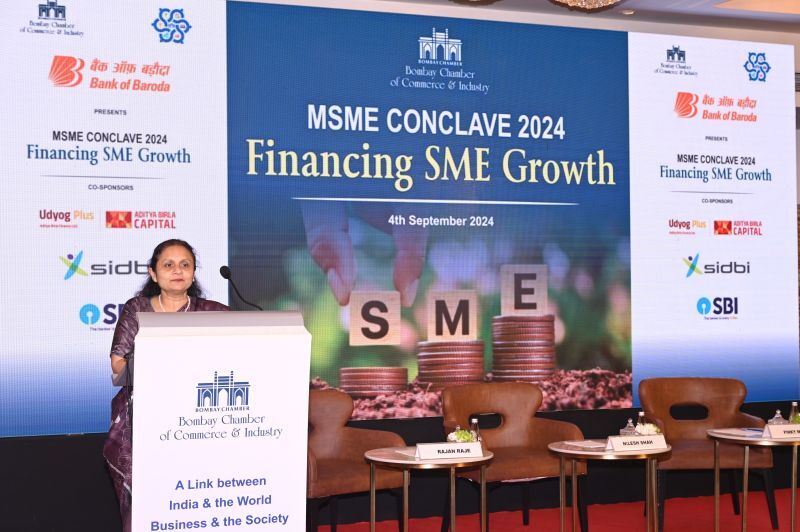
In her welcome address, Pinky Mehta, President of the Bombay Chamber, and Director, Aditya Birla Sun Life Insurance Ltd, highlighted the Chamber’s 188-year legacy in India’s development and its extensive representation of MSMEs. She underscored the Chamber’s commitment to supporting MSMEs in overcoming financial challenges and unlocking their growth potential.
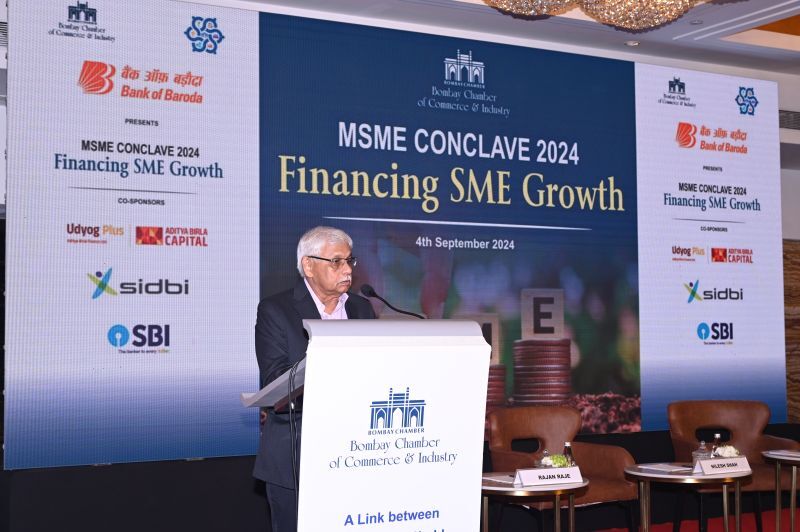
Rajan Raje, Chairperson of the MSME Committee, Bombay Chamber and CEO of Nichem Solutions, set the theme for the Conclave. He emphasised that while the MSME sector is the largest employment generator, it often lacks professionalism and resources. He acknowledged the government’s initiatives, such as the New Credit Guarantee Scheme, increased Mudra Loan limits, and the expansion of the TReDS platform, which support the sector’s growth. “The SME sector must think big and explore the export market systematically,” Raje stated, adding that credit availability is largely determined by the “3 C’s” – Cash Flow, Character, and Collateral.
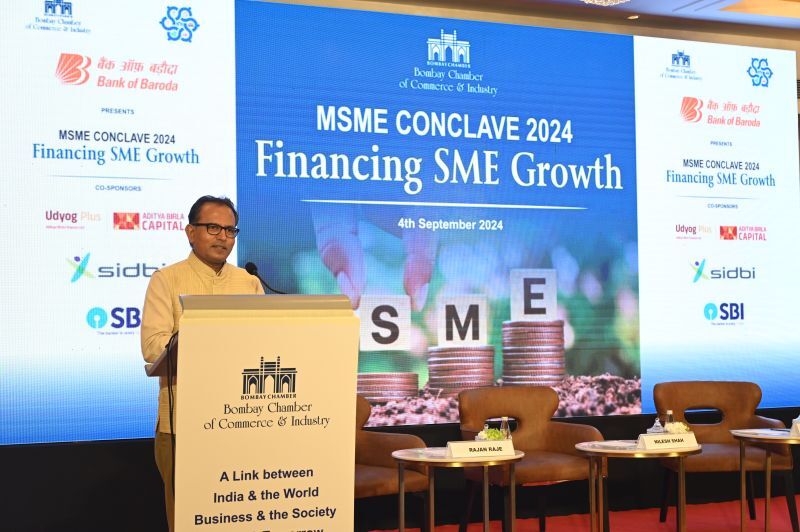
The keynote address was delivered by Nilesh Shah, Group President & MD of Kotak Mahindra AMC, who discussed the challenges and opportunities faced by MSMEs. He spoke about the need for resources in the form of equity, debt, and hybrid financing to enable faster growth. Shah highlighted three successful models that MSMEs could emulate: The Morbi Model: Post-flood rebuilding of Morbi into a ceramics hub, now accounting for 90% of India’s ceramics production with $2 billion in exports. The Tirupur Model: Textile manufacturers form a cooperative for efficient cost management and industry-scale benefits, including centralised purchasing, advertising, and pollution management and the Amul Model: The cooperative that transformed India into the world’s largest milk producer and aims to be the largest FMCG company by 2047. Shah also lauded the Reserve Bank of India’s new system for instant verification of SMEs and borrowers, which will significantly shorten the credit appraisal cycle.
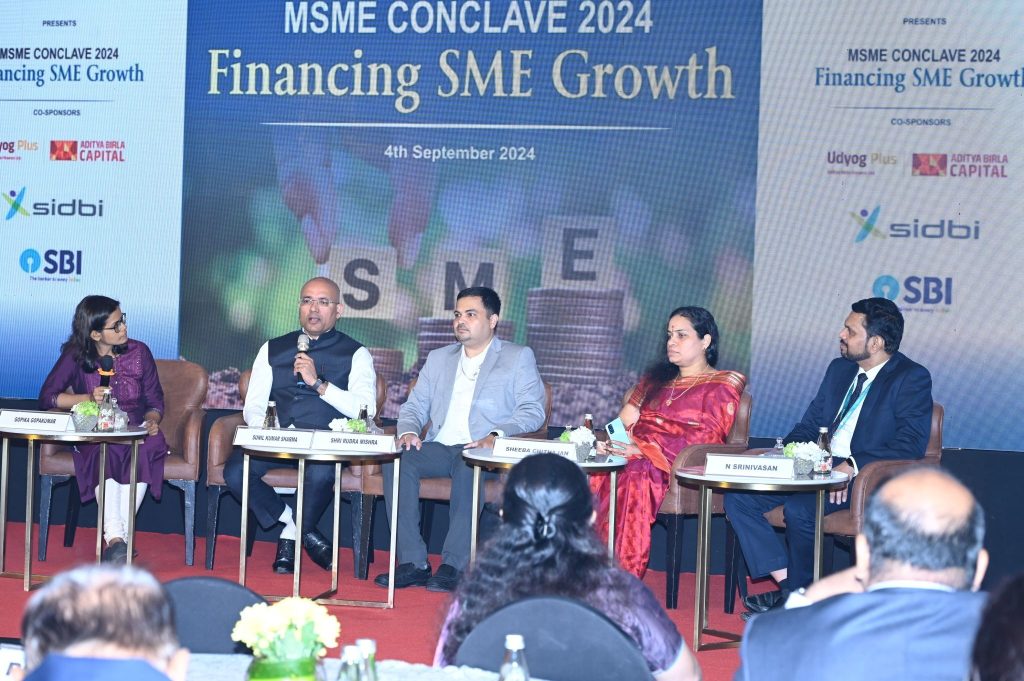
The Conclave featured two insightful panel discussions. The first panel on “Export-Import Financing” for SMEs, moderated by Gopika Gopakumar, Senior Assistant Editor, Livemint, Mr. Sunil Kumar Sharma, General Manager & Zonal Head, Bank of Baroda, Shri Rudra Mishra, Assistant General Manager, SIDBI, N Srinivasan, General Manager Transaction Banking, IDBI Bank and Sheeba Chithajan, DGM (SME) SBI LHO Mumbai Metro. They discussed how their institutions are supporting SMEs in entering and thriving in the export market, including the range of financial products available for the MSME sector. They highlighted the hygiene factors that banks expect SMEs to meet before receiving export support. The panel also examined the challenges MSMEs face in accessing funding, especially for exports to developing countries, and shared success stories and their impacts on SME growth.
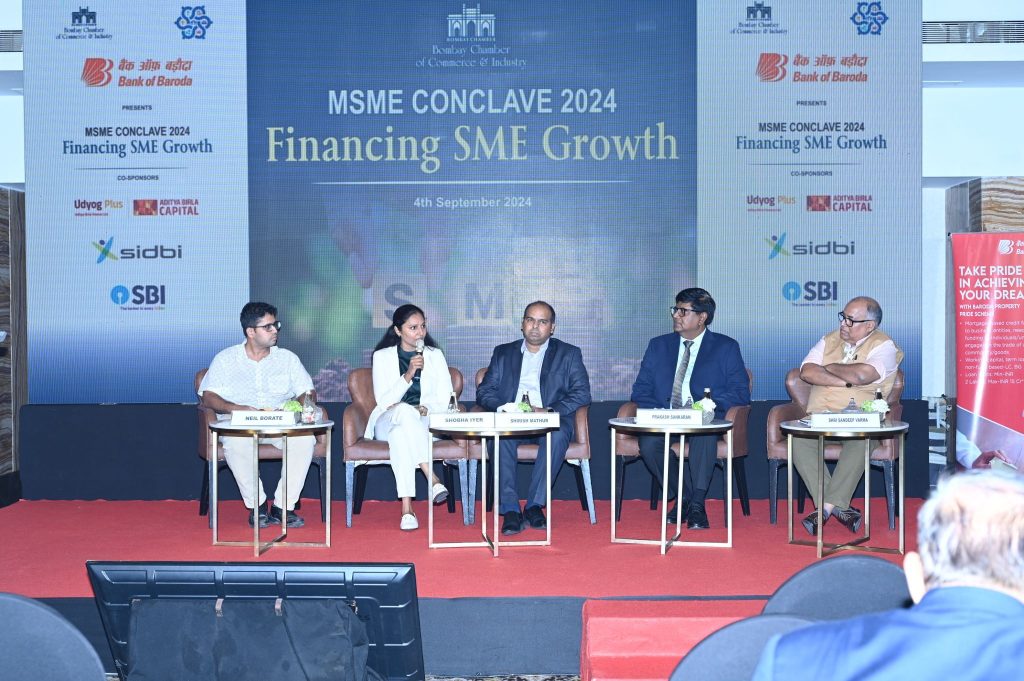
The second panel, titled “Financing Through NBFCs,” was moderated by Neil Borate, Deputy Editor at Livemint, and featured Shobha Iyer, Director Commercial at Olea; Shirish Mathur, Head of SME Products & Digital Platforms at Aditya Birla Finance Ltd.; Prakash Sankaran, Managing Director & CEO of Invoicemart; and Sandeep Varma, CEO of the Credit Guarantee Fund Trust for Micro and Small Enterprises (CGTMSE). The discussion highlighted the crucial role of Non-Banking Financial Companies (NBFCs) in supporting SMEs through tailored financial products, flexible loan terms, and faster processing times compared to traditional banks. The panellists also explored potential solutions, including government subsidies, credit guarantees, and fostering a competitive lending environment to help reduce interest rates.
In a fireside chat titled “Catalysing SME Growth Through Innovative Financing Solutions,” Shri Deependra Singh Kushwah, I.A.S., Development Commissioner (Industries), Government of Maharashtra, discussed government initiatives to support MSMEs, including the MAITRI portal and the MIDC Plug and Play facility. He also requested members of the MSME sector to leverage these tools and initiatives and proactively approach the Government for any support or guidance.
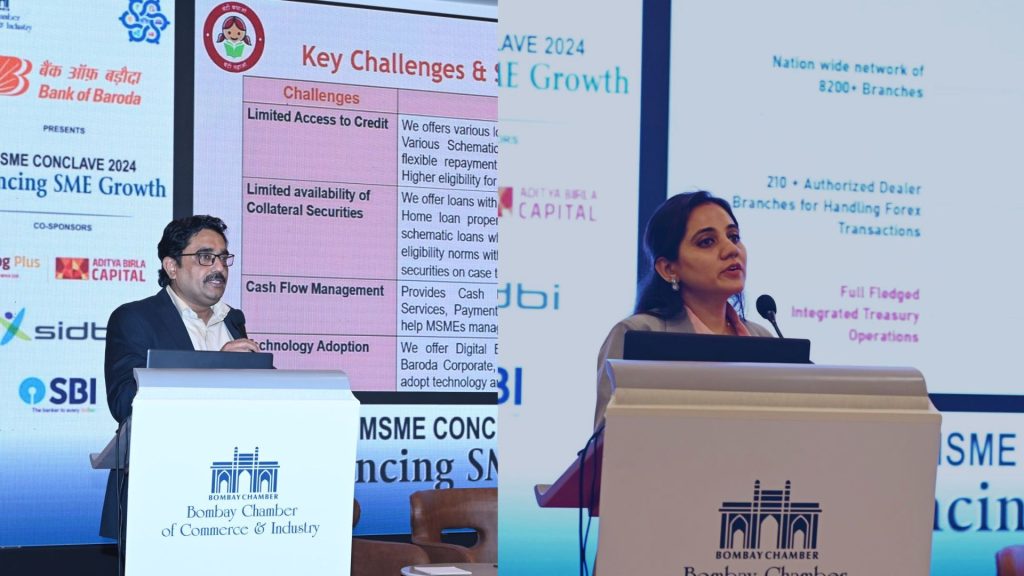
The Conclave also featured a presentation by the Bank of Baroda on “Empowering MSME Growth: Leveraging Our Flagship Products & Trade Finance Offerings,” delivered by Sandeep Prakash, Assistant General Manager of MSME Sales, and Tania Das, Senior Manager of the Forex Department, Mumbai Zone. Additionally, Shirish Mathur presented the facilities and services available to MSMEs on the Aditya Birla Udyog Plus website.
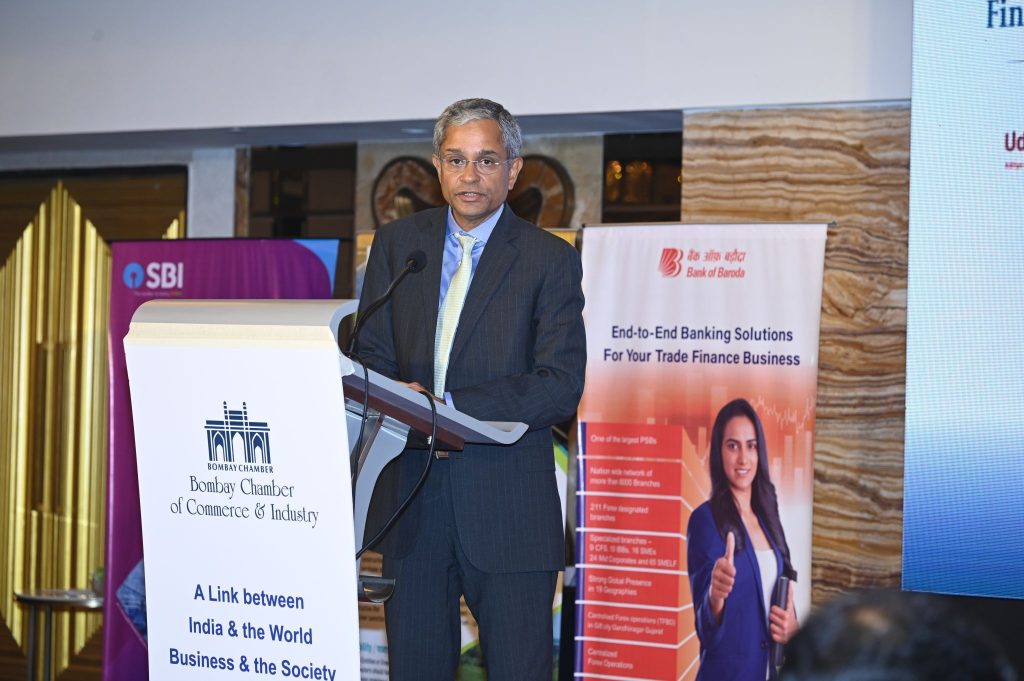
Rajiv Anand, Senior Vice President of the Bombay Chamber and Deputy Managing Director of Axis Bank, delivered the Vote of Thanks . The event was supported by Bank of Baroda, Aditya Birla Finance Ltd., SIDBI, and SBI.
UNDP Partners with the DFINITY Foundation to Enhance Financial Inclusion of MSMEs
UNDP Partners with the DFINITY Foundation to Enhance Financial Inclusion of MSMEs

ZURICH, SWITZERLAND, JULY 3rd, 2024 – UNDP is pleased to announce a new partnership with the DFINITY Foundation, which will leverage the Internet Computer blockchain technology to further develop and implement the Universal Trusted Credentials (UTC) initiative. This collaboration underscores a significant step towards enhancing digital trust and financial inclusion for Micro, Small, and Medium Enterprises (MSMEs) globally.
This framework – the Universal Trusted Credentials (UTC) launched in collaboration with the Monetary Authority of Singapore (MAS) and other strategic partners,– when implemented in several countries, will not only enhance domestic access to financing for MSMEs but also unlock access to trade financing across participating countries due to the enhanced cross-border trust in the data provided. The UTC solution aims to stimulate the adoption of digital technologies, which will include blockchain-based solutions, with the view to ultimately build a vibrant and sustainable financial ecosystem that empowers MSMEs.
The DFINITY Foundation will utilize its expertise in decentralised compute platforms and digital identity solutions to develop and test the prototype for a robust data infrastructure (platform) for the UTC pilot initiative in Cambodia. This infrastructure will ensure the secure storage and management of digital credentials, enhancing the trust and reliability of the UTC system.
“The partnership with the DFINITY Foundation marks a pivotal moment in our efforts to advance digital inclusion and economic empowerment for MSMEs in Cambodia,” stated Marcos Neto, UN Assistant Secretary General and Director of UNDP’s Bureau for Policy and Programme Support. “By harnessing cutting-edge technology, we can create a more secure and accessible digital credentialing system that will drive sustainable development and economic growth.”
The DFINITY Foundation is the creator and major contributor to the Internet Computer Protocol (ICP), the underlying technology that will be instrumental in building a decentralized and tamper-proof data infrastructure, providing the high level of security and transparency needed for the UTC initiative to succeed. This collaboration will not only benefit Cambodian MSMEs but after the pilot in Cambodia, this project plans to scale to 10 countries.
“MSMEs represent the backbone of most economies, and the UTC initiative represents a unique opportunity to bring transparency and increase inclusion within a financial system that often fails to cater to their needs”, stated Dominic Williams, Chief Scientist and Founder of the DFINITY Foundation. “By utilizing the Internet Computer blockchain technology, the UTC initiative is set to benefit from over a thousand person-years of research and development and will be supported by some of the leading cryptographers and experts in the field of digital identity”.
This initiative is part of a broader effort by the UNDP to leverage technology and innovation to achieve the Sustainable Development Goals (SDGs) and improve the livelihoods of vulnerable populations.
For more information on the UTC initiative and the DFINITY Foundation, please visit UNDP Singapore Centre website and the Internet Computer website.
 20 Oct 2022
20 Oct 2022
MSMEs Can Continue Availing Non-Tax Benefits Of Category It Was In Before Re-Classification
In a move that will further Ease of Doing Business for the MSME segment, the Ministry of MSME has notified that in case of an upward change in terms of investment in plant and machinery or equipment or turnover or both, and consequent re-classification, an enterprise can continue to avail of all non-tax benefits of the category it was in before the reclassification, for a period of three years from the date of such upward change.
As per the notification, the decision was taken after due deliberations with MSME stakeholders and in line with the Aatma Nirbhar Bharat Abhiyan. Non-tax benefits include benefits of various schemes of the Government, including Public Procurement Policy, Delayed Payments, etc.
Data shared by the Government shows that 93,048 micro enterprises had become small enterprises in the period July 2020 and July 2022, while 10,141 small businesses had grown to become medium businesses in the same period.
 05 Oct 2021
05 Oct 2021
How to Survive during Covid-19 for MSMEs
Inputs / Recommendations on How to Survive during Covid-19 for MSMEs by Bombay Chamber of Commerce and Industry are discussed. Set out below are our inputs and recommendations on How to Survive during Covid-19 for MSMEs.
 12 Oct 2020
12 Oct 2020
Survey Report – Enterprise Change Management-managing Changes at MSMEs
The Economic Policy Research & Development (EPR&D) Committee and MSME Expert Committee of Bombay Chamber of Commerce & Industry have taken the initiative of conducting a quick survey related to perceived business challenges over the next twelve months among MSME members.
The survey result highlights some challenges of doing business in India involving industrial development generally and development of MSMEs in particular. The same provides inputs for regulatory review.
(Survey Result Based on Inputs Received from Members of Bombay Chamber)


It is a long established fact that a reader will be distracted by the readable content of a page when lookin







